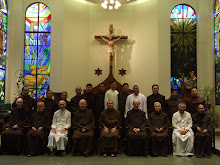Sometimes during prayer, I find myself whispering disconcertingly to God the following words, "Here's another fine mess you've gotten us into." This line comes from the celebrated Laurel and Hardy comedy sketches of pre-war vintage. I'm hoping that God does not get too annoyed with me when I say these words because it is meant to be more of a comic relief than a complaint. Holy Mother St. Teresa of Jesus had her own version on this axiom when she addressed God saying, "If this is how you treat your friends, no wonder you have some few." Fr. Eugene Flamegh, CICM, my Church History professor at Maryhill School of Theology labeled it "pious blasphemy."

This brings my long-winded introduction to the main theme of this essay: the mystery of suffering. Why do people who respond to the Lord's call to mission more often than not have to suffer? Can't they just have a good time while "laboring" in the Lord's vineyard?
These depth-plumbing questions invite us to a short (I hope) digression. I find it quite ironical that in the English language , the word "suffer" can also sometimes be translated to mean "allow" (as in Jesus' command to His disciples "suffer the little children to come to me"). This gives the reader a hint to the general direction of my reflections. I don't think God wants anybody to suffer, especially not those who consider God to be their primary employer. It is more probable that He "allows" suffering to take place for a greater good ... whatever good that might be (it's supposed to be a mystery remember).
Suffering in itself may not be very valuable or useful. It is the lessons we learn from the pain, the hardships and the tribulations that makes the experience of suffering worthwhile. Try to recall an experience of complete certainty (e.g., the certainty of one's vocation). This certainty could not have come about if a person had not at first experienced paralyzing doubt and confusion. Or consider an attitude of hopefulness. One can only develop this attitude if he or she had been initially placed in situations of hopelessness. Hope is engendered because a person chooses to respond in a positive way to trials that seem quite insurmountable.
There is an old adage that says, "God can write straight with crooked lines." As in the proverbial Job, our task is not to question God on how, when and why He makes crooked lines straight. Our job (pardon the pun) is to believe, to trust... that in the end, "everything will work out for the good of those who love God and who are called according to His will."





No comments:
Post a Comment